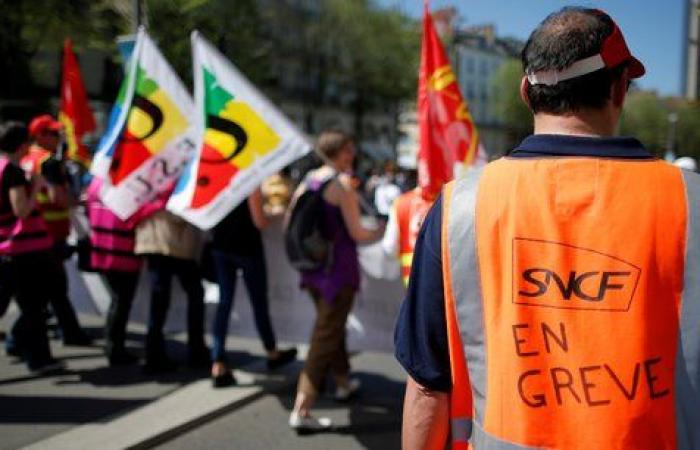The future of Fret SNCF was not the only subject on the table Tuesday morning between the unions and the group's management. But it certainly held a good place in these discussions, initiated following a request for immediate consultation (DCI) filed jointly by the four representative organizations. And for good reason, on January 1, the SNCF group subsidiary dedicated to freight transport will disappear to make way for two new entities: Hexafret and Technis.
With less than two months to go before the deadline, the social framework of the two future companies has not yet been defined, which raises many concerns for employees. Faced with this situation and after a conciliation meeting which has so far failed to find common ground, a strike notice was filed early in the evening. It covers Thursday, November 21. Consideration is being given to a repeatable movement in December.
Fabien Villedieu, federal secretary of Sud-Rail, has not given up on pushing the government back on the discontinuation of Fret SNCF, decided under pressure from the European Commission. As a reminder, the latter had opened an investigation at the beginning of 2023 into the payment of 5.3 billion euros in state aid to make up the subsidiary's deficit. He doesn't think like that “what a bad decision that weakens rail freight and its main operator in the midst of the climate crisis”. He thus believes that the government is rushing, while the Spanish socialist Teresa Ribera has been proposed to take the post of European Commissioner for Competition.
The SNCF is gaining in profitability despite a context considered difficult
A disguised social plan
Beyond that, it is above all a question of preserving the social conditions of the approximately 5,000 employees of SNCF Fret, a workforce mainly made up of status railway workers, as well as 700 contract workers. Around 4,000 of them must join Hexafret, which will take over the role of rail operator from Fret SNCF, now emptied of dedicated train activity, as well as 23 lines left to private players to meet the demands of Brussels. Another 500 will join Technis for maintenance activities. This leaves the last 500 employees forced to change branch.
The unions are confident that there will be no layoffs, as promised. But Lionel Ledocq, Unsa-Ferroviaire federal secretary in charge of freight and ecological transition, still sees it “a disguised social plan” with reclassifications, retraining and early retirements. He also mentions departures, particularly abroad where salary conditions are much more attractive.
However, a good number of the employees concerned have already found a position in the group. According to Fret SNCF, this is the case for two thirds of them. The remaining third benefits from personalized support. Figures relatively consistent with union sources. A good number of them have migrated to the TER activity, which is very demanding, starting with drivers.
The State shareholder (the APE) approves the discontinuation of Fret SNCF
Those who remain
The situation is no less complex for those who remain in freight. In accordance with the announcements, railway workers transferred to Hexafret and Technis will retain their status. This is less true with regard to the social agreements negotiated at SNCF level, despite the maintenance of future companies within the group. Some will continue, like the pension agreement which is currently being finalized. Others will be called into question, starting with those concerning the organization of working time or even salary negotiations at group level, warns Fabrice Chambelland, national secretary of the CFDT Cheminots.
For his part, Fabrice Charrière, secretary general of Unsa-Ferroviaire, points out the possible deterioration in the management of professional careers. Transferred employees risk losing the benefit of agreements such as that on the end of their career – the signing of which led to the ire of the government against Jean-Pierre Farandou, CEO of SNCF, last spring.
Controversy over the end of the careers of railway workers: “The SNCF earns 1.3 billion euros, it can well finance 35 million euros” (Farandou)
The CFDT representative wants to remain faithful to the essence of his union and “avoid the politics of the worst”. In fact, he intends to negotiate until the end but plans to enter into the balance of power in the event of failure. He also sees the organization of working time as a possible “casualty of war” because of the possible implications in terms of flexibility and precariousness.
A poorly executed transition agreement
The main way out of the conflict lies in the negotiation of a transition agreement. Launched under the previous legislature, the discussions were frozen with the dissolution. SNCF management has just relaunched the process, but time is running out between now and January 1st. Fabrice Charrière is skeptical about the possibility of bringing the negotiations to a successful conclusion on time.
Fabrice Chambelland, who considers the management's proposals quite far from the level of current conditions, does not show overwhelming optimism either. Representatives of Unsa and CFDT specify that this transition agreement will – in any case – only last 36 months, with new agreements subsequently to be negotiated within Technis and Hexafret.
SNCF Freight: the specter of a disaster scenario similar to that of Alitalia
For its part, Fret SNCF assures that it wants to give each of the two future entities a social framework that is more protective than that of the collective agreement and attractive. In addition to maintaining status, it intends to guarantee elements of social protection, movement facilities and even professional careers within the SNCF group. But it specifies that this framework will have to be adapted to the competitive sector in which it operates. According to her, this requires work organization methods and job content consistent with the activities of the subsidiaries and their production needs.
If no agreement is reached, the collective agreements in force at Fret SNCF will be maintained at Hexafret and Technis for a period of 15 months. The future management and union bodies of the two entities will therefore have to get down to negotiating new agreements very quickly. And this, even though Rail Logistics Europe – the holding company which oversees the freight companies of the SNCF group, including Fret SNCF today then Hexafret and Technis tomorrow – must open its capital by 2026, as Fabien Villedieu recalls at SOUTH-Rail.






